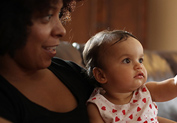The College of Medicine's commitment to engagement with our surrounding communities through service activities is longstanding. Through the Office of Community Engagement, meaningful community service and reflective learning prepares medical students to understand socioeconomic determinants of health, better care for the most vulnerable members of our community and become community-responsive physicians. A variety of curricular and co-curricular experiences are supported throughout the students' four years. Some examples of these experiences include:
Download the Office of Community Engagement info sheet [PDF]
The Health Advocacy Practicum
The Health Advocacy Practicum (HAP) is a core course for all 260 first and second-year Drexel medical students. Students receive didactics in social determinants of health, health disparities and trauma responsive care. The major focus of the course is a community-based practicum experience in the first year, through which students learn from the lived experiences of their community partners and develop and apply basic health coaching and health advocacy skills.
Download the Health Advocacy Practicum FAQs [PDF].
Year 1: The community practicum takes place over two to three afternoons/month, from October to May. Students work with any of the following populations: housing insecure/homeless; youth at risk; elderly at risk; refugees; medical disability impacted by high social need. Settings include residential, school, community, medical and other organizational sites. Programs are tailored to each site specifically, so that they can be mutually beneficial to all involved (participants, staff and med students).
Year 2: While the focus of Year 1 is the cultivation of longitudinal relationships, Year 2 is geared more toward understanding the underlying social factors that impact health. Students complete a didactic component as well as a capstone project related to a topic of their interest.
Back to Top
Health Outreach Project Clinics (HOP)

Through the Health Outreach Project (HOP) clinics, students work as health advocates in student-run free clinics and health services throughout the city. Physician-supervised weekly acute care clinics are maintained at the Salvation Army Rehabilitation Center in Roxborough, Eliza Shirley Shelter for homeless mothers and their children in Center City, and the Street Side clinic for intravenous drug users in Kensington. In addition, students staff weekly wellness clinics at The Arc of Philadelphia, a day center for adults with developmental disabilities, and St. Raymond's, a long-term residence for formerly homeless and chronically ill people. Sporadic HOP Programs are held at the True Gospel Tabernacle Church Daycare, the Nationalities Service Center, and various health fairs in the community. Students also provide rotating services in smoking cessation, stress reduction, and Narcan training.
Health Outreach Project: Student-Run Clinics Care for Vulnerable Communities Alumni Magazine Spring/Summer 2019
Back to Top
Bridging the Gaps
Bridging the Gaps (BTG) links the education of students in the health and social service professions with the provision of health-related service in economically insecure communities. Run by a consortium of all the academic health institutions in Philadelphia, BTG consists of three components:
COMMUNITY HEALTH INTERNSHIP PROGRAM
The Bridging the Gaps Community Health Internship Program (BTG CHIP) is a seven-week, paid, summer internship for graduate-level students in the health disciplines. BTG CHIP provides non-clinical heath related services to underserved populations, while incorporating interdisciplinary training on the psychosocial issues affecting health and the delivery of healthcare. Student interns are assigned in interdisciplinary teams to work at a community site four days per week and spend one day each week in didactic sessions.
SEMINAR SERIES
The BTG Seminar Series draws upon the expertise of participating community partners and academic health centers to address topics related to population health and care coordination. The sessions are designed to augment professional curricula in various content areas and to offer concrete strategies for addressing issues affecting vulnerable populations. Eight seminars are held in the evening during the academic year with dinner served beforehand.
CLINICAL ROTATION
The BTG Clinical Program is an interdisciplinary experience providing students with the opportunity to become more skilled in collaborative community clinical service for underserved populations. As with BTG CHIP, the Clinical Program provides meaningful service to a partnering clinical/community site by allowing the site to access additional human resources (health/social service professions students).
CLINICAL SCHOLARS
Students graduate as Bridging the Gaps Clinical Scholars by participating in the Bridging the Gaps Community Health Internship Program, attending a minimum of six Bridging the Gaps population-health seminars and completing the Bridging the Gaps clinical rotation.
Back to Top
Volunteer Opportunities
Drexel University College of Medicine hosts group visitors from summer camps as well as local elementary and high schools throughout the year. Medical students lead tours, give presentations, and serve as guides to the visitors in the labs. In addition, students frequently lead community health-related initiatives with the Office of Community Engagement serving as an administrative hub.
Back to Top
Community Health Elective for Fourth-Year Medical Students
The course, "Providing Health Care for Vulnerable Populations," is a transdisciplinary elective for 4th year medical students offered by the Office of Community Engagement. The elective provides students the opportunity to gain skills in inter-professional clinical community-based service for underserved populations. It allows students to understand the social, cultural and economic barriers to health care affecting patients in Philadelphia as well as develop clinical strategies that address health disparities and social determinants of health (i.e. education, income, neighborhood). Students may choose between rotating at the HOP Clinics or being assigned to one of the BTG Clinical sites.
Back to Top